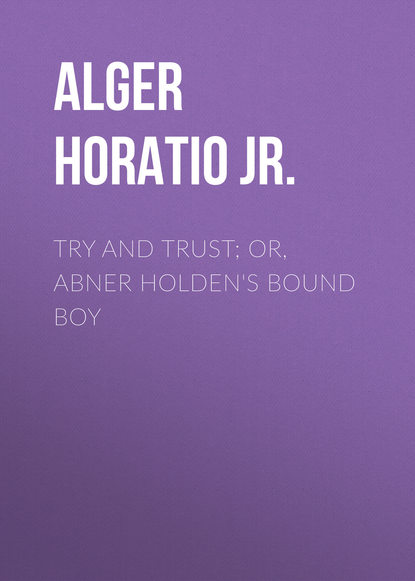По всем вопросам обращайтесь на: info@litportal.ru
(©) 2003-2025.
✖
Try and Trust; Or, Abner Holden's Bound Boy
Настройки чтения
Размер шрифта
Высота строк
Поля
“That’s the sum you will oblige me by keeping,” said Mr. Carroll. “I hope it may be of service to you.”
“You give me so much money?” said Herbert, in surprise.
“It is but a very small sum, compared with that which you have saved me.”
“I don’t think I ought to take so much,” said Herbert, hesitating.
“You need not hesitate, my young friend. I am blessed with abundant means, and very well able to part with it. Besides, it is only one per cent. of the money which you have been instrumental in saving me, and you are certainly entitled to as much as that.”
“I thank you very much for the gift, Mr. Carroll,” said our hero, “and still more for the kind manner in which you give it to me.”
“You accept it, then? That is well,” said the old gentleman, with satisfaction. “There is one thing more. You remember that I spoke to you of a business firm in Pearl Street, New York, with the members of which I am acquainted. Last evening I prepared a letter of introduction to them for you. Here it is.”
“Thank you, sir,” said Herbert. “I was very fortunate in meeting with one so able and willing to assist me.”
“You are very welcome to all the help I am able to give you. I shall be very glad if your life shall be as prosperous as mine has been. I must trouble you to do me one more service. If you will find me a cab, I will go at once to my friend’s house.”
No difficulty was experienced in obtaining a carriage. There was a cordial leave-taking, and Herbert once more found himself alone. But with rather more than sixty dollars in his pocket, he felt rich, and looked forward eagerly to his arrival in the great city, where he hoped to deserve and win success.
CHAPTER XXII
ROBBED IN THE NIGHT
Herbert entered the cars, and took a seat by the window. His small bundle, containing all the extra clothing he had been able to bring away from the inhospitable home of Mr. Holden, he placed in the seat beside him.
It was yet early, and there were but few persons in the car. But as the hour for starting approached, it gradually filled up. Still, the seat next to Herbert remained untaken.
At length a young man, apparently about nineteen, walked up the aisle, and, pausing, inquired, “Is this seat engaged?”
“No,” said Herbert, at the same time removing his bundle.
“Then, if you have no objection, I’ll take possession.”
He accordingly seated himself, and commenced a conversation.
“Going to New York?” he asked.
“Yes,” said Herbert.
“Do you live there?”
“No; I have never been there before.”
“Are you going on a visit?”
“No; I am going to live there; that is, if I can find anything to do.”
“Are you alone?”
“Yes.”
“So am I. Suppose we hitch teams.”
“I don’t understand.”
“Suppose we go to some hotel together. I have been there before, and can tell you where to go. It’s awful dull being alone. I always like to pick up company.”
Herbert hardly knew what to say to this proposition. He did not exactly like the appearance, or fancy the free and easy manners of his new acquaintance, but he felt lonely, and, besides, he hardly knew what excuse to make. He, therefore, gave his assent to the arrangement proposed.
“What’s your name?” asked his new friend, familiarly.
“Herbert Mason.”
“Mine is Greenleaf—Peter Greenleaf. Have you come from a distance?”
“From Waverley, in Ohio, not far from Cincinnati.”
“I am from Philadelphia. I’ve been in a store there, but I didn’t like the style, and I concluded to go to New York. There’s more chance for a fellow of enterprise there.”
“What sort of a store were you in?”
“Dry-goods store—Hatch & Macy. Old Hatch is a mean skinflint, and wouldn’t pay me half what I was worth. I don’t want to brag, but there wasn’t a man in that store that sold as much as I did. And how much do you think I got?”
“I don’t know.”
“Only seven dollars a week. If I hadn’t made something another way. I couldn’t have paid my expenses.”
“I should think you might live on seven dollars a week.”
This was before the war had increased the expenses of living.
“Couldn’t do it. Board cost me four dollars a week, and that only left three for other expenses. My cigars cost me nearly that. Then I wanted to go to the theater now and then, and, of course, I must dress like a gentleman. I tell you what, seven dollars a week didn’t begin to do me.”
“How did you manage, then?”
“Oh, I made so much more by banking.”
“By banking?” repeated Herbert, in astonishment.
“Yes; only it was a faro bank. I used to pick up considerable that way, sometimes.”
“A faro bank!” repeated Herbert, in dismay. “Why, that’s the same as gambling, isn’t it?”
“Well, what’s the odds? You take your chance, and you may win or lose. It’s a pretty fair thing.”
After this confession, Herbert became more than ever doubtful whether he should care to remain long in the company of his present companion.
Meanwhile, the cars were moving rapidly. Peter Greenleaf, as he called himself, talked volubly, and appeared to have a considerable familiarity with certain phases of life, the knowledge of which was not likely to have been very profitable to him. Still, Herbert was interested in his communications, though the opinion which he formed of him was far from favorable.











